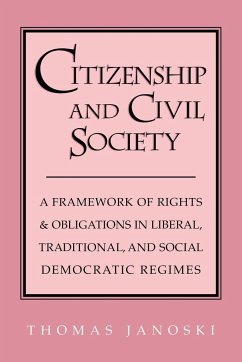Rights and obligations are confusing. When people really want or need something they call it a right. Can they simply attach this word to anything they want? Can people disregard obligations with impunity? This book argues that they cannot. One must understand those relationships in specific ways to really know what can or can not be done with rights and obligations in public discourse and politics. They must create a web of interaction between citizens so that more long-term social investments may be made. Professor Janoski shows that individual rights protecting privacy, free speech, and legal access are more highly developed in social democratic countries than in liberal countries. On the other hand, obligations in those same social democratic countries are higher. On the whole, rights and obligations are in balance; or, you get what rights you pay for in terms of fulfilling obligations to the state and society.
Table of contents:
1. Introduction to citizenship; 2. The framing of citizens' rights: expansion, clarification, and meaning; 3. Reconstructing obligations and patriotism: limitations, sanctions and exchange in a system of rights; 4. Citizen-selves in restricted and generalized exchange; 5. The balance of rights and obligations through nesting, civil society, and social culture; 6. Incremental change in citizenship over decades: power resources, state structures, ideology, and external forces; 7. Momentous change over centuries: from Wasps to Locomotives in the development and sequencing of rights; 8. Conclusions and implications; Bibliography.
Rights and obligations are confusing. When people really want or need something they call it a right. Can they simply attach this word to anything they want? Can people disregard obligations with impunity? This book argues that they cannot. Rights and obligations are systematically related in important ways backed by the state.
This book shows how legal, political, social, and participation rights are systematically related to liberties, claims and immunities.
Hinweis: Dieser Artikel kann nur an eine deutsche Lieferadresse ausgeliefert werden.
Table of contents:
1. Introduction to citizenship; 2. The framing of citizens' rights: expansion, clarification, and meaning; 3. Reconstructing obligations and patriotism: limitations, sanctions and exchange in a system of rights; 4. Citizen-selves in restricted and generalized exchange; 5. The balance of rights and obligations through nesting, civil society, and social culture; 6. Incremental change in citizenship over decades: power resources, state structures, ideology, and external forces; 7. Momentous change over centuries: from Wasps to Locomotives in the development and sequencing of rights; 8. Conclusions and implications; Bibliography.
Rights and obligations are confusing. When people really want or need something they call it a right. Can they simply attach this word to anything they want? Can people disregard obligations with impunity? This book argues that they cannot. Rights and obligations are systematically related in important ways backed by the state.
This book shows how legal, political, social, and participation rights are systematically related to liberties, claims and immunities.
Hinweis: Dieser Artikel kann nur an eine deutsche Lieferadresse ausgeliefert werden.








